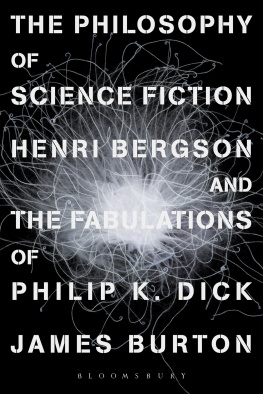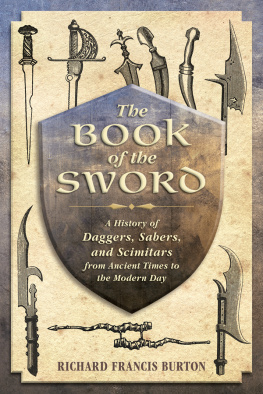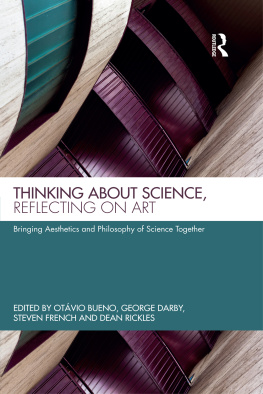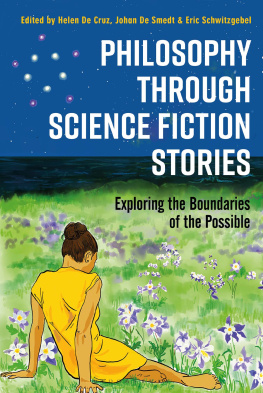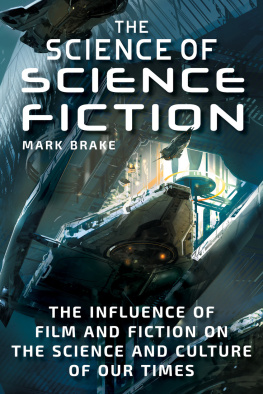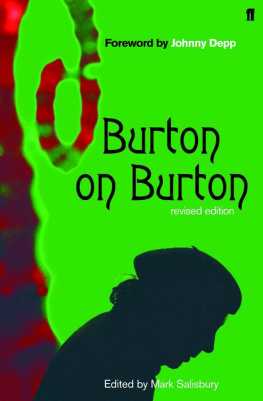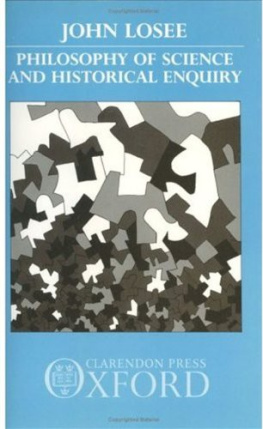Burton - The Philosophy of Science Fiction
Here you can read online Burton - The Philosophy of Science Fiction full text of the book (entire story) in english for free. Download pdf and epub, get meaning, cover and reviews about this ebook. year: 2015, publisher: Bloomsbury UK, genre: Science. Description of the work, (preface) as well as reviews are available. Best literature library LitArk.com created for fans of good reading and offers a wide selection of genres:
Romance novel
Science fiction
Adventure
Detective
Science
History
Home and family
Prose
Art
Politics
Computer
Non-fiction
Religion
Business
Children
Humor
Choose a favorite category and find really read worthwhile books. Enjoy immersion in the world of imagination, feel the emotions of the characters or learn something new for yourself, make an fascinating discovery.
The Philosophy of Science Fiction: summary, description and annotation
We offer to read an annotation, description, summary or preface (depends on what the author of the book "The Philosophy of Science Fiction" wrote himself). If you haven't found the necessary information about the book — write in the comments, we will try to find it.
The Philosophy of Science Fiction — read online for free the complete book (whole text) full work
Below is the text of the book, divided by pages. System saving the place of the last page read, allows you to conveniently read the book "The Philosophy of Science Fiction" online for free, without having to search again every time where you left off. Put a bookmark, and you can go to the page where you finished reading at any time.
Font size:
Interval:
Bookmark:

The Philosophy of Science Fiction
Also available from Bloomsbury
Henri Bergson: Key Writings , edited by
Keith Ansell Pearson and John Maoilearca
Understanding Bergson , Understanding Modernism , edited
by Paul Ardoin, S. E. Gontarski and Laci Mattison
I Am Alive and You Are Dead: A Journey into the
Mind of Philip K. Dick , Emmanuel Carrre
The Philosophy of Science Fiction
Henri Bergson and the Fabulations
of Philip K. Dick
James Burton
Bloomsbury Academic
An imprint of Bloomsbury Publishing Plc

Contents
The researching and writing of this book took place in several different contexts. Part of the final manuscript was produced during a fellowship at the Ruhr University, Bochum, generously funded by the Alexander von Humboldt Foundation. I am grateful to the Institute for Media Studies at Bochum, and in particular Erich Hrl and Maren Mayer-Schwieger, for providing great intellectual stimulation within a supportive working environment, and for helping me find time to work on this manuscript alongside other projects. The patient support and feedback of Leila Whitley was invaluable during this phase of the writing.
The books main argument, along with earlier versions of several sections, was central to a doctoral thesis researched and produced at Goldsmiths, University of London, between 2003 and 2008. During that time I benefited greatly from the supervision and support of Scott Lash and Howard Caygill, each of whom made the extraordinary range of his intellectual and intuitive knowledge of cultural theory and philosophy available to me throughout (and has done since). I am also grateful to John Hutnyk for his comments on a late draft of that text, and to Andrew Benjamin and Josh Cohen for their careful engagement with the final version. Within the already vibrant interdisciplinary research community at Goldsmiths, I was lucky enough to be surrounded by an exceptional group of fellow students and staff, who provided endless opportunities for stimulating and open-minded discussion on a limitless range of topics: among many others, I would especially like to thank Laura Cull, Sean McKeown, Joel McKim, Theresa Mikuriya (to whom I am also indebted for generous feedback on several drafts), Susan Schuppli, Craig Smith, Daisy Tam, and everyone in the Contemporary Thought seminars.
Though too late to have any substantial effect on the text, a series of inspiring encounters and presentations in late 2012 at the Philip K. Dick Festival (San Francisco) and the Worlds Out of Joint conference (Dortmund) with, among others, Dilara Bilgisel, Erik Davis, Alexander Dunst, Daniel Gilbert, David Gill, Ted Hand, Pamela Jackson, Roger Luckhurst, Laurence Rickels, Lord Running-Clam (aka David Hyde) and Stefan Schlensag offered much encouragement for the completion of my own project and the future of Philip K. Dick studies in general.
I am also indebted to the following for a range of contributions, some tangible, some intangible, some recent, some going a long way back: Jay Basu, Pete De Bolla, Laura Burton, D. F. Chang, Deirdre Daly, Robin Durie, Geoff Gilbert, James Gitsham, David Kleijwegt, Yari Lanci, Chris Manasseh, Joe McKee, Leo Mellor, John Maoilearca (then Mullarkey), Sebastian Olma, Ian Patterson, Michael Williams, Tom Wills, David Wright and Nicky Zeeman.
Finally, this book would never have been completed without the constant love and support (and patience) of my parents, Janice and Gil.
Where a work is cited for the first time in a chapter, the first date given is the edition used or cited, followed by the date of the works original publication, if different, in square brackets; thereafter only the date of the edition consulted is given. Certain frequently cited works are abbreviated as follows:
CE Bergson, Henri (1998), Creative Evolution (Toronto: Dover Publications) [1907]
MR Bergson, Henri (1977), The Two Sources of Morality and Religion (Notre Dame, IN: University of Notre Dame Press) [1932]
TR Agamben, Giorgio (2005), The Time That Remains: A Commentary on the Letter to the Romans (Stanford, CA: Stanford University Press) [2000]
SP Badiou, Alain (2003), Saint Paul: The Foundations of Universalism (Stanford, CA: Stanford University Press) [1997]
E Dick, Philip (2011), The Exegesis of Philip K. Dick (New York: Houghton Mifflin Harcourt), ed. Pamela Jackson and Jonathan Lethem
Where there are multiple references to a single novel, only the page number of the cited edition is given, except where this might lead to confusion.
In his Histories , Herodotus tells of a battle interrupted and a war ended by what we would now think of as a natural event. The conflict between the Lydians and the Medes had been ongoing for more than five years, with neither side able to establish a decisive dominance. Then, during a battle in the sixth year,
the day suddenly turned into night. The Ionians received a prediction of this eclipse from Thales of Miletus, who had determined that this was the year in which an eclipse would occur. The Lydians and the Medes, however, were astonished when they saw the onset of night during the day. They stopped fighting, and both sides became eager to have peace. (Herodotus 2007: 445 [1.74])
Why should a sudden, though short-lived, inversion of day and night be mirrored by the inversion of war and peace? It is not too hard to imagine how the unexpected descent of a shadow across the battlefield might have given rise to a spontaneous ceasefire. Even today, an eclipse will cause people to stop what they are doing. But in this case, Herodotus tells us, there was no resumption of normal activity when the sun re-emerged: instead, everything was different, and the two warring sides, having made peace, entered a lasting alliance.
Whether we consider Herodotus an inquiring historian or a storyteller, this account seems to invite us to speculate, to experiment with ways of filling in the absent details, just as Walter Benjamin responded to Herodotus account of the grief of Psammenitus in The Storyteller (1999: 8990). How was this astronomical event able to have such a lasting effect on human affairs? Were the Lydians and the Medes already weary of the conflict, simply waiting for a legitimate pause in the fighting to open negotiations? Or did the turning of day into night have a more dramatic effect, being taken as the literal or symbolic herald of the end of the world whose onset abated only when the fighting ceased? Or might the merging of the sun and the moon, two entities appearing equal in power and size, have been interpreted as a sign that the two equally matched peoples should align themselves into a single, superior force?
Missing from such speculations is the significance of the fact that Thales had predicted the eclipse. Does Herodotus include this merely as a tangential historical detail, to add context and corroboration to the main story? Or, conversely, might it have played a more active role in the alchemical transmutation of war into peace? Herodotus seems to imply that the soldiers might have reacted differently had they, like the Ionians, been forewarned of the eclipse. But what if they were astonished precisely because news of the prediction had reached them? The idea of being able to anticipate the occurrence of an eclipse based on natural observations was not established as it is today: indeed, Thales reputed pioneering ability in such areas is among the reasons many have regarded him as the founder of Western philosophy and some as the first scientist. Yet in that he was extrapolating from his contemporary scientific knowledge to tell of strange future events, in an era in which accurate predictions of this kind were virtually unknown, it would be tempting to add to these accolades the title of first science fiction storyteller.
Font size:
Interval:
Bookmark:
Similar books «The Philosophy of Science Fiction»
Look at similar books to The Philosophy of Science Fiction. We have selected literature similar in name and meaning in the hope of providing readers with more options to find new, interesting, not yet read works.
Discussion, reviews of the book The Philosophy of Science Fiction and just readers' own opinions. Leave your comments, write what you think about the work, its meaning or the main characters. Specify what exactly you liked and what you didn't like, and why you think so.

